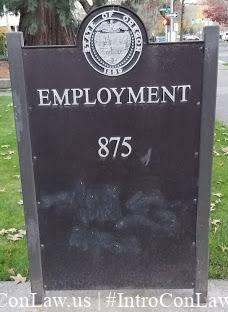The Volokh Conspiracy
Mostly law professors | Sometimes contrarian | Often libertarian | Always independent
Today in Supreme Court History: November 6, 1989
Editor's Note: We invite comments and request that they be civil and on-topic. We do not moderate or assume any responsibility for comments, which are owned by the readers who post them. Comments do not represent the views of Reason.com or Reason Foundation. We reserve the right to delete any comment for any reason at any time. Comments may only be edited within 5 minutes of posting. Report abuses.
Please to post comments



Weeth v. New England Mortgage Security Co., 106 U.S. 605 (decided November 6, 1882): the Supreme Court used to have jurisdiction when a “certificate of division” was presented to it, where there was a disagreement between the District Judge and the Circuit Justice (from the Supreme Court); here (in a dispute over loan repayment) a certificate was rejected because it called upon the Court to get into fact-finding
Mount Lemmon Fire District v. Guido, 139 S.Ct. 22 (decided November 6, 2018): 20-employee minimum required for liability under Age Discrimination Act of 1967 does not apply to state entities (here, a local fire department)
Miles v. Apex Marine Corp., 498 U.S. 19 (decided November 6, 1990): Jones Act allows wrongful death claim (extending the holding of Moragne v. States Marine Lines, 1970, from longshoremen to seamen) (I remember Moragne from first-semester Torts class; at the time I thought: “wrongful death”? is there such a thing as rightful death?)
The opposite of wrongful death would seem to be not-wrongful death rather than rightful death. I suppose choosing death for some heroic purpose would be rightful; perhaps choosing euthanasia in appropriate circumstances, or maybe just death by natural causes at a very advanced age.
The opposite of wrongful death is wrongful birth, which does exist as a tort in some jurisdictions.
The opposite of death is life, not birth. I suppose if euthanasia were legal one might sue for wrongful life if it failed.
It seemed a strange distinction to make, if you're going to court. It should be just a suit for "death".
I suppose it's so described as it's a death arising out of a wrong. If there is no wrong, there is no wrongful death.
Welcome to Lonely Street.
This decision is on the SCOTUS chopping block, I suspect.
Are you saying that to favor religious beliefs SCOTUS "would open the prospect of constitutionally required religious exemptions from civic obligations of almost every conceivable kind"? OK, but first they'll have to figure out how to limit it to the right kind of religious beliefs.
but first they’ll have to figure out how to limit it to the right kind of religious beliefs.
Yeah. I think that's their major sticking point. But I can imagine a dishonest argument based on "history and tradition" hence "legitimately" including Christianity but excluding Islam, Hinduism, etc.
On this date in 1906, Charles Evans Hughes was elected governor of New York, defeating newspaper magnate William Randolph Hearst. Of the seven statewide elections held that day in New York, this was the only one carried by the Republican candidate. Hughes would win re-election in 1908. That year Republicans swept all the statewide elections.
Hughes would resign as governor in October 1910 with three months left in his term to accept his appointment to the Supreme Court by President William Howard Taft. In 1916, Hughes would reluctantly step down from the Court to accept the GOP presidential nomination, eventually losing to incumbent President Woodrow Wilson. Hughes would return to the Court in 1930, this time as Chief Justice, having been appointed to the position by President Herbert Hoover.
I always thought the US missed a good bet by not electing Hughes. He would have made a good president and probably a better war leader. (I think war was inevitable, assuming we didn't elect Debs.)